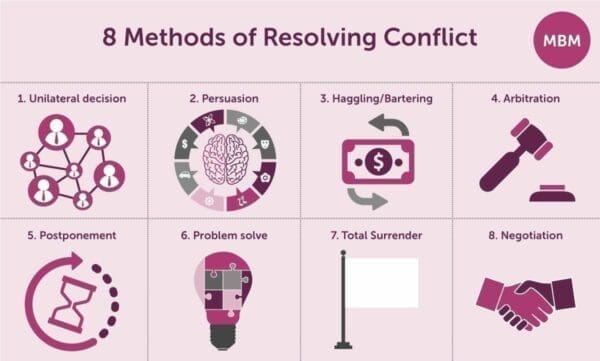Conflict is Hard. Anyone Who Tells You That They Don’t Mind it is Either Lying, Donald Trump, or a Serial Killer!
With these one-sentence tips for managing conflict in the workplace, we hope to give you that edge which means that you don’t reflect after work thinking how the hell did that happen? Or, why didn’t I say x? Or I should have spoken up for myself. There is no silver bullet for managing conflict. It is hard. It can take its toll on us all, but if we can just make it 1% easier for you to manage, then that’s worth learning.
Which tip will you take away and use?
Tips 1-10
- 1. Find something that they say to agree with and obviously not something you don’t agree with because that would be disingenuous, but something similar to ‘We’re on the same team’, or ‘We both have the same goal’, or ‘Neither of us needs this right now’.
- 2. The most advice someone will give you is ‘take a breath’, though when you are in the ‘heat of battle, you don’t want to, so ignore this advice, unless you really can do it, and then ‘well done you!’.
- 3. Know that there are 8 methods of resolving a conflict and knowing them will help you to maybe choose a better option, for example, problem solving.

- 4. Sometimes you’re wrong and it hurts but you are, so you have to say that immortal word – ‘Sorry!’.
- 5. A wise woman once said that conflict was, ‘10% about the content and 90% about the attitude’, so your attitude matters – choose wisely.
- 6. Thomas-Killmann identified that there are 6 default behaviours when we are in conflict, and knowing which one you most choose will help you to know more about yourself and why you do what you do in conflict.
- 7. Rolling your eyes, huffing, and folding your arms, are just a few of the many ways we communicate what we really think when we argue, and being aware of what we are doing during that time will help us communicate exactly what we want to communicate without the person hearing more of our body language than our words.
- 8. Using ‘I’ statements, like ‘I’d like the opportunity to explain’, is better than ‘You’re not listening’.
- 9. How would you describe your tone during conflict?
- 10. We all want to be ‘right’, but measure the importance of being right versus the relationship and focus on which one is more important.

Tips 11-20
- 11. If you can use humour to lighten the mood, as long as it is not inappropriate or trying to belittle the other person.
- 12. Metaphors like ‘Pressure makes a diamond’ can help to lighten your mind.
- 13. Avoid the Drama Triangle at all costs!
- 14. Cooling off and coming back to it later is a lesson we all should have learnt after the last time we argued.
- 15. ‘Yes, I agree’, can be very disarming and can be used like, ‘Yes, I agree that neither of us needs this’.
- 16. We’ve all used irritators, like rolling our eyes – know that these are exactly what they say on the tin, and will achieve that objective of irritating the other person.
- 17. Conflict is a part of life and it doesn’t all have to be fight or flight because there is a middle route where you exchange views, listen, and find common ground.
- 18. You can ‘agree to disagree’ and that is ok.
- 19. Managing a team? Research ‘Tuckman’s model’.
- 20. Remember Stephen Covey’s Habit 5: ‘Seek First to Understand, Then to Be Understood’.

Tips 21-29
- 21. People mostly want to be heard, and if they are, they’ll then live with the decision.
- 22. Remain solution-focused and not problem-focused because you’ll just go round in circles!
- 23. Understand that most people are fighting their own battle, so being kind is a good way forward.
- 24. Don’t ask questions that aren’t real, for example, ‘So why is it that you did that?’ because you don’t want the answer and will probably cut them off when they reply anyway.
- 25. If you want the conflict to escalate, this will guarantee it; Start shouting – Don’t.
- 26. Share how you feel with words like, ‘This is making me feel very angry and I’d rather not be’.
- 27. Use the mnemonic of ‘FUSION’, which stands for Focus, Understanding, Specific, Language, Open and No “Rude” language.
- 28. Ask yourself what a leader would do in this situation.
- 29. Focus on the facts – the sweetie and not the wrapper – the what’s happening rather than the behaviour.
There you have it, 29 tips for managing conflict in the workplace. Use one, or use them all, anything will help you in managing conflict in the workplace.
Want more? Check out our ultimate guide on Conflict Resolution Skills.




